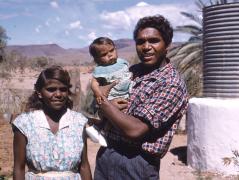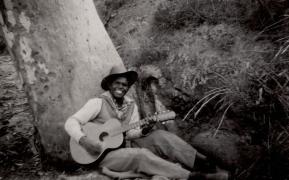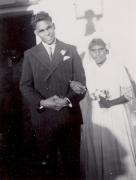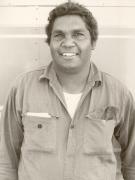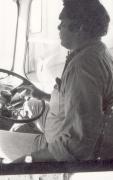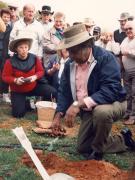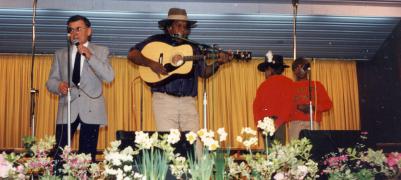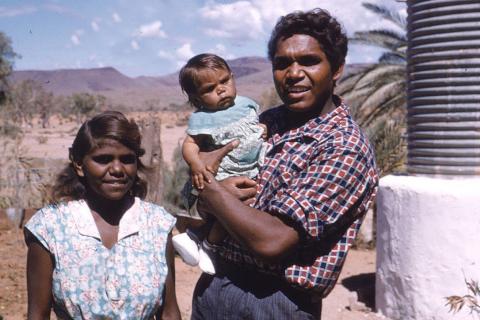Gus Williams was a respected leader of his people, a musician and country singer and a devoted family man. Remembered by many as a man of strong convictions and passion, whether performing on stage, on the football field, or standing up for reconciliation. 1
Lead singer of the Hermannsburg Church Choir
Williams became involved in Lutheran song for kinship reasons since several of his great uncles were evangelists. His grandfather Johannes Ntjalka and his grandmother Maria were, in his own proud words, “among the first baptised” in addition to his innate love of singing. 2
After losing both his parents at the age of 17, Gus and his brothers and sisters moved to Hermannsburg to live with his grandfather. He sang in the church choir at Hermannsburg and eventually became its lead singer. In 1967, he and the choir toured nationally with the choir singing a selection of songs at Adelaide Town Hall which were recorded on a memorial album. During the tour, Williams performed to approximately 12,000 people at 13 concerts in Adelaide and regional South Australia and Victoria. They recorded an LP record intended “to bring the music and message of Christian aborigines [sic] into your homes”. 3
The national tour of the Hermannsburg choir was heralded as a success at the time and is remembered by the community of Ntaria as an important part of their recent history. Hermannsburg’s Lutheran co-pastor at the time was Doug Radke who observed that the tour was like a “Missionary venture… in reverse” the aim of which was to educate non-Indigenous southerners in Christian ways towards “the strangers of our society - the aborigines [sic]”. 4
Gus Williams knew that through the choir on the tour, he was speaking to a powerful southern audience, and that he was speaking for those whom he called “all of our people”. He used his introductions and commentaries to make political statements to non-Indigenous audiences and to promote a greater understanding of Arrarnta people and culture.
Early Tourism at Hermannsburg
He also sang on the Camp Fire Concert album, a souvenir album for tourists put out by Sundowner Safari Tour Company which was recorded around a campfire in Palm Valley. He drove the coaches down the track to Palm Valley, and entertained tourists with country songs such as Hank Williams’s “My son calls another man Daddy.”
A Little Bit Country…
His cousin, Albert Namatjira, and others brought gramophones to the community, and Gus Williams was smitten once and for all with a love of country music. He trained his sons to play the guitar from an early age and they formed part of his band from the mid to late 1960s. Later, in the 1970s he moved with his family to his mother’s country 500km north of Alice Springs. He became president of Warrabri Council and later formed the first electric country band in the Northern Territory - The Warrabri Country Bluegrass Band.
He organised the first Northern Territory Aboriginal Country Music Festival, which became an annual showcase for Aboriginal country music.
He moved with his family back to Hermannsburg in the late 1980s and he was council chairman for 30 years. Gus’ strong leadership and passion for his land, meant he was instrumental in the work that led to the land being handed back from the Finke River Mission to the Ntaria Land Trust.
He recorded several albums on his own label. He was awarded the Order of Australia in 1983, for services to country music and Aboriginal people. In 2005, he was inducted into the Hall of Fame at the NT’s Indigenous Music Awards. His son Warren H. Williams is also a well-known country artist.
"…was a formidable force as an organizer and promoter of Aboriginal country music in the desert region and he encouraged numerous young men to pursue country music careers." (Ottoson 2015)
The albums he released include:
- I’m Not Trying To Forget – Ntjalka Music
- My Kind Of Heaven (1993) – Ntjalka Music
- Southern Cross (1993) – Ntjalka Music
- Storm In My Heart – Ntjalka Music
- Straight From The Heart (1992) – Ntjalka Music
- Through The Years (1994) – Hadley Records
Other awards:
- 1983 - Medal of the Order of Australia for services to country music and Aboriginal people
- 2000 - inducted into the Country Music Hall of Fame in Tamworth.
- 2001 - Deadly Award for Outstanding Contribution to Aboriginal Music.
- 2004 - Country Music Centenary Medal from the Country Music Association of Australia for service to through Aboriginal and Torres Strait Islander music.
- 2005 - Williams was inducted into the Hall of Fame at Music NT's Indigenous Music Awards.
- Henderson 2010
- Gus Williams, “Commentary of Concert Programme,” typescript in Olga Radke, Hermannsburg Choir Tour Diary, 74–90 cited in Hurley 2017 p 22
- Radke, Cover note for Hermannsburg Choir on tour LP
- Pastor Radke cited in Hurley, A W 2017 Farewell My Country Hermannsburg, Gus Williams, and the Indigenised Heimatlied. Journal of Australian Studies, Vol. 41, N. 1, 18–31: 20
- Hurley 2017:18
Media
